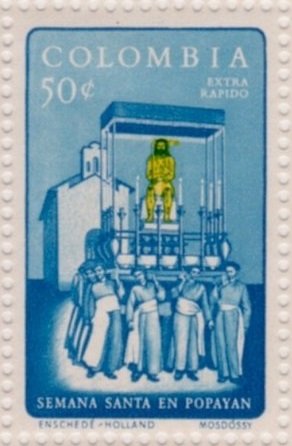Stamp: Easter week procession in Popayàn (Colombia 1961)
Easter week procession in Popayàn (Colombia 1961)
10 October (Colombia ) within release Issued to honor Atlantico,Cauca and Santander Departments goes into circulation Stamp Easter week procession in Popayàn face value 50 Colombian centavo
| Stamp Easter week procession in Popayàn in catalogues | |
|---|---|
| Michel: | Mi: CO 995 |
| Stamp Number: | Sn: CO C410d |
| Leo Temprano: | Lt: CO HF23d |
Stamp is vertical format.
Stamp from souvenir sheet MI BL24. Express air mail stamp for domestic use. Inscribed EXTRA RAPIDO. Printed by Joh. Enschede en Zonen, Netherlands. Designed by Mosdóssy. The Holy Week in Popayán, Cauca is the celebration of the Passion and death of Jesus Christ through daily processions continuously performed since the sixteenth century between Good Friday nights and Holy Saturday. This parade takes place in the ancient streets of the "White City". Religious images arranged on a wooden platform with 4 front and 4 back bars are carried in the shoulders of the "Cargueros". These images are representations of different episodes recounted in the Gospels on the Passion, Crucifixion and Death of Jesus Christ. Each performance is a "paso" (step). On September 30, 2009 it was declared a Masterpiece of the Oral and Intangible Heritage of Humanity by the UNESCO committee.Also in the issue Issued to honor Atlantico,Cauca and Santander Departments:
- Stamp - Ships in Barranquilla Harbour face value 50;
- Stamp - Easter week procession in Popayàn face value 50;
- Stamp - Monastery Hotel,Popayàn face value 50;
- Stamp - Coat of Arms, View of San Gil face value 1;
- Stamp - Arms of Bucaramanga face value 50;
- Stamp - Arms of Barranquilla face value 35;
- Stamp - Arms of Popayan face value 40;
Stamp Easter week procession in Popayàn it reflects the thematic directions:
Easter, also called Pascha (Aramaic, Greek, Latin) or Resurrection Sunday, is a Christian festival and cultural holiday commemorating the resurrection of Jesus from the dead, described in the New Testament as having occurred on the third day of his burial following his crucifixion by the Romans at Calvary c. 30 AD. It is the culmination of the Passion of Jesus Christ, preceded by Lent (or Great Lent), a 40-day period of fasting, prayer, and penance.
Religion is any cultural system of designated behaviors and practices, world views, texts, sanctified places, ethics, or organizations, that relate humanity to the supernatural or transcendental. Religions relate humanity to what anthropologist Clifford Geertz has referred to as a cosmic "order of existence". Different religions may or may not contain various elements ranging from the "divine", "sacred things", "faith", a "supernatural being or supernatural beings" or "some sort of ultimacy and transcendence that will provide norms and power for the rest of life". Religious practices may include rituals, sermons, commemoration or veneration (of deities), sacrifices, festivals, feasts, trances, initiations, funerary services, matrimonial services, meditation, prayer, music, art, dance, public service, or other aspects of human culture. Religions have sacred histories and narratives, which may be preserved in sacred scriptures, and symbols and holy places, that aim mostly to give a meaning to life. Religions may contain symbolic stories, which are sometimes said by followers to be true, that have the side purpose of explaining the origin of life, the Universe and other things. Traditionally, faith, in addition to reason, has been considered a source of religious beliefs. There are an estimated 10,000 distinct religions worldwide. About 84% of the world's population is affiliated with one of the five largest religions, namely Christianity, Islam, Hinduism, Buddhism or forms of folk religion.
Tourism is travel for pleasure or business; also the theory and practice of touring, the business of attracting, accommodating, and entertaining tourists, and the business of operating tours. Tourism may be international, or within the traveller's country. The World Tourism Organization defines tourism more generally, in terms which go "beyond the common perception of tourism as being limited to holiday activity only", as people "traveling to and staying in places outside their usual environment for not more than one consecutive year for leisure, business and other purposes". Tourism can be domestic or international, and international tourism has both incoming and outgoing implications on a country's balance of payments. Today, tourism is a major source of income for many countries, and affects the economy of both the source and host countries, in some cases being of vital importance.



